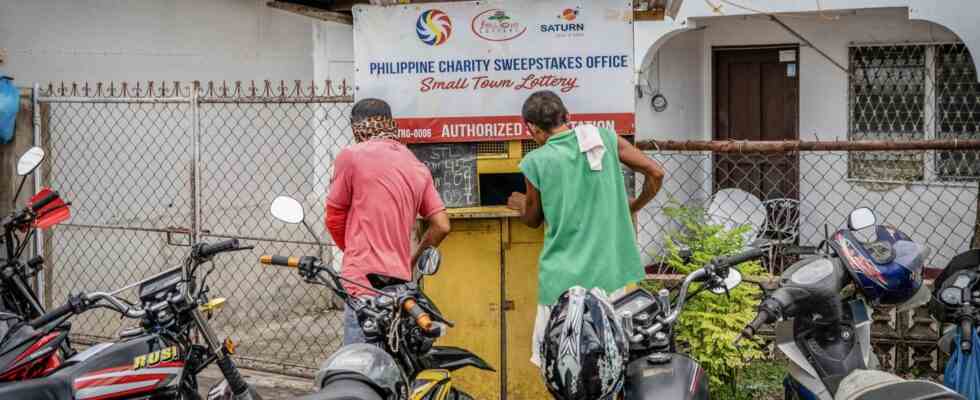Philippines
Lottery win by 433 people causes nationwide discussions
Lottery and gambling are extremely popular in the Philippines
© Matt Hunt / Picture Alliance
In a state lottery draw in the Philippines, 433 people scooped the jackpot in one fell swoop. Is it all just luck or is there more to it? An independent investigation should now provide answers.
A draw by the state lottery in the Philippines is currently making headlines around the world. Last Saturday, more than 400 people cheered at the daily lottery number announcement in Manila. They all want to have found the correct six on their ticket. Can this have happened properly?
The simultaneous success of 433 people in a single lottery draw triggers skepticism from many observers. How is it that so many people have picked the right combination 09-18-27-36-45-54 and is it really coincidence that all the winning numbers are multipliers of nine? Not only many people in the social media have been dealing with these questions for a week, but also in Philippine politics.
The organizers of the lottery, the Philippine Charity Sweepstakes Office, are confident that there has been no evidence of fraud or any inconsistencies. General Manager Melquiades Robles told reporters Sunday the draw was a normal event, except that there were a few more winners than usual.
Scientists argue about lottery draw
Gambling and especially the lottery are very popular among the Filipino population. Similar to Germany, players choose six numbers between 1 and 55. To win the jackpot, the numbers must match the winning balls. Two years ago, former President Rodrigo Duterte imposed a temporary ban on investigating corruption at the state association. However, this was rescinded a little later. A spokesman for the ex-president announced at the time that the electric lottery machines were far less susceptible to fraud than most other games of chance. Since then, the machines and balls used for the draw have been inspected daily. This process is even televised. Fraud therefore seems unlikely.
Guido David also shares this opinion. Earlier in the week, the mathematician from the University of the Philippines in Diliman published an analysis of the weekend’s lottery results. Just like Robles, he starts from the “multiples-of-nine theory”. The number combination is just as likely as any other – 1 in 28,989,675. However, since many people would have bet on the nine-number row, there would be an above-average number of winners. Professor Jomar Rabajante from the University of Los Baños also follows this argument. He shared a scientific article during the week which revealed that nine is a particularly popular number among gamblers.
The renowned economist Solita “Winnie” Collas-Monsod sees it very differently. She appealed to the 0.0000000345 percent probability of a single lottery win. The fact that 433 people have such a lucky hit seems suspicious, according to Monsod.
It is therefore not surprising that more and more prominent voices are now expressing doubts about the legitimacy of the lottery draw. Along with a few unfortunate attendees, both House and Senate representatives throughout the week called for an independent investigation into the event. The opposition leader in the House of Representatives, Marcelino Libanan, released a statement justifying the investigation as protecting the hopes and dreams of millions of Filipinos. In an interview with the New York Times, Aquilino Pimentel III, leader of the opposition in the Senate, agreed. The results are “not impossible, but highly unlikely”.
433 winners of the lottery – just coincidence?
According to Chua Tin Chiu, chance’s biggest doubters provide the basis for what is probably a fairly simple explanation. After all, it’s not mathematically impossible for 433 people to hit the jackpot at the same time. The statistician from the National University of Singapore explained in an interview with the “New York Times”: “People are very good at recognizing patterns. Nevertheless, this is a certain phenomenon that is based on chance.” Chiu therefore simply considers the result “not unusual”. An investigation could therefore at most deal with organizational details. It is possible that a particularly large number of people would have bought a ticket that day.
The 433 lucky winners from Saturday now have a warm shower of money in store. The total prize money of four million US dollars is not enough for anyone alone, but everyone can still look forward to at least 545,000 Philippine pesos, the equivalent of about 9300 US dollars. That is more than twice the average annual income in the Philippines.
Sources:New York Times, CNN, BBC, Yahoo News



